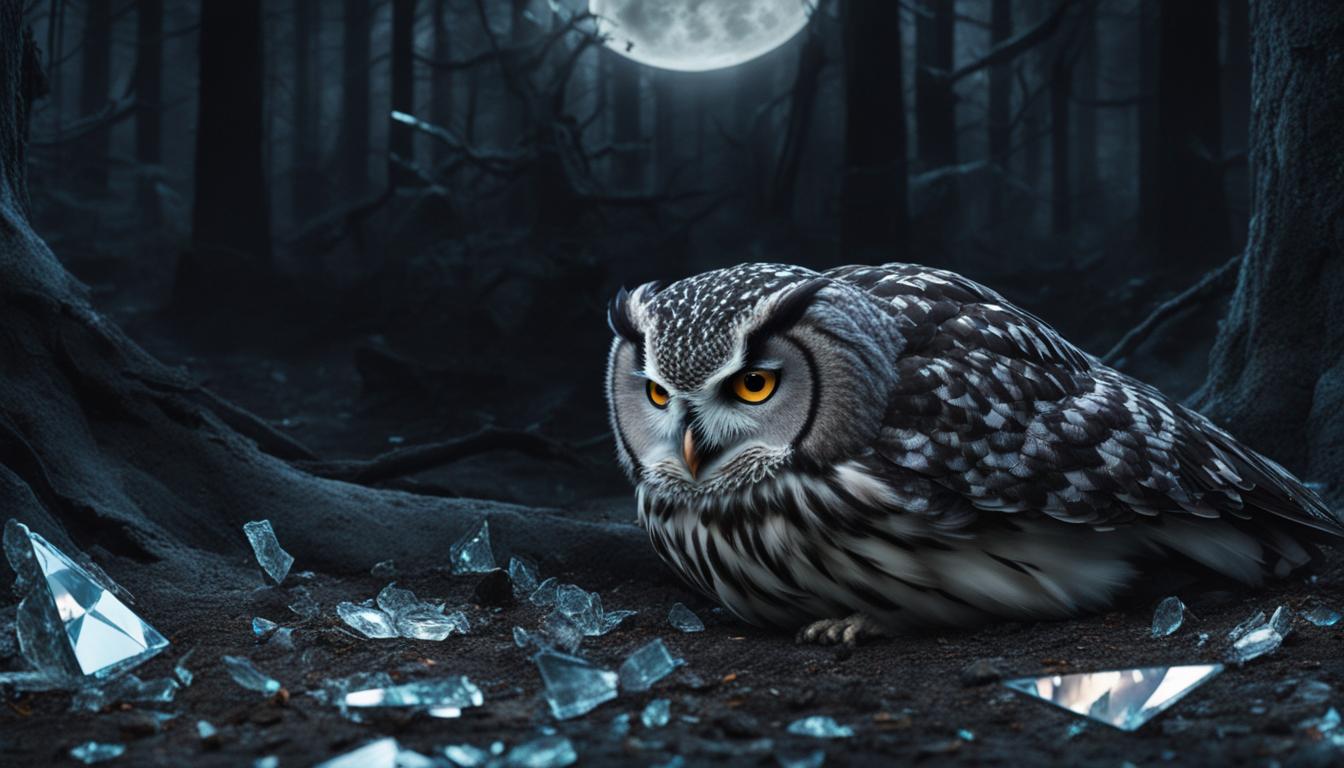Originally posted on November 16, 2023 @ 5:44 am
Throughout history and across different cultures, owls have been revered and feared. Their mysterious nature, nocturnal habits, and unique appearance have made them the subject of many beliefs, superstitions, and myths. One of the most common questions people ask is whether killing an owl is considered bad luck.
In this article, we will explore the fascinating world of owl symbolism, cultural beliefs, and spiritual interpretations surrounding owl killings. From ancient rituals to modern conservation efforts, we will examine the historical and ecological significance of owls, shedding light on their cultural value and importance in our world.
Key Takeaways:
- Owls have been the subject of many beliefs, superstitions, and myths.
- The question of whether killing an owl is considered bad luck is a common one.
- In this article, we will explore owl symbolism, cultural beliefs, and spiritual interpretations surrounding owl killings.
- We will examine the historical and ecological significance of owls, shedding light on their cultural value.
- From ancient rituals to modern conservation efforts, our aim is to provide a comprehensive understanding of this fascinating topic.
Understanding Owl Symbolism
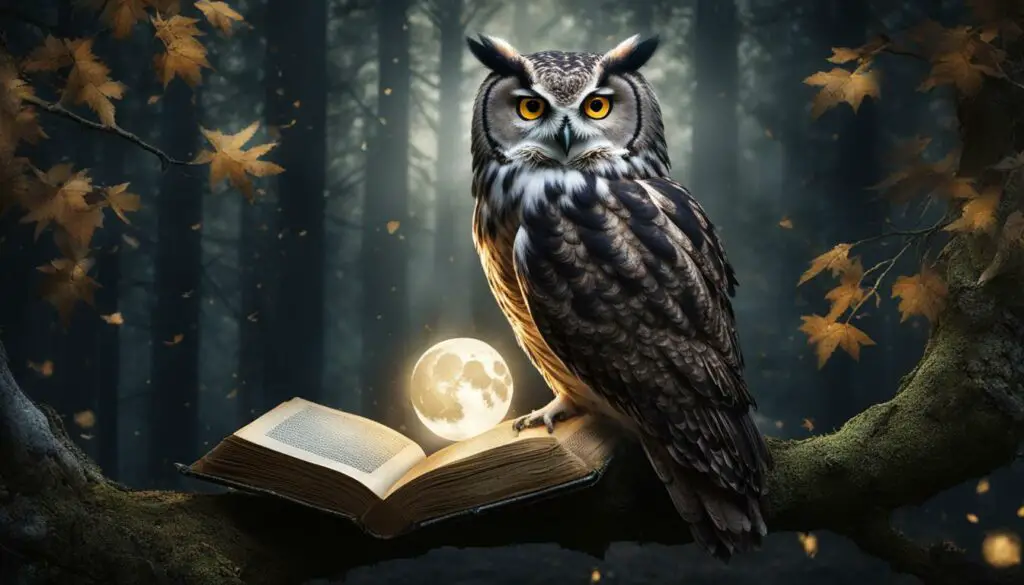
Owls have been revered throughout history for their wisdom, strength, and mystery. They hold a significant place in numerous cultures, each with their own interpretation of these magnificent creatures.
In ancient Greece, Athena, the goddess of wisdom, was often depicted with an owl perched on her shoulder, signifying the bird’s association with intelligence and knowledge.
In Native American cultures, the owl is often seen as a powerful spirit animal, representing wisdom, intuition, and the ability to see beyond the veil of illusion.
In Hinduism, the goddess Lakshmi is often depicted with an owl as her vehicle, representing wealth, prosperity, and good luck.
Aside from its reputation for wisdom, the owl is also associated with death and the afterlife in many cultures. In some cultures, the presence of an owl is seen as an omen of impending death or misfortune.
Overall, the owl’s symbolism varies widely depending on the culture, but it remains a powerful and revered creature in many societies.
“The owl is a bird of darkness and magic, a symbol of mystery and dreams.”
Superstitions about Owls
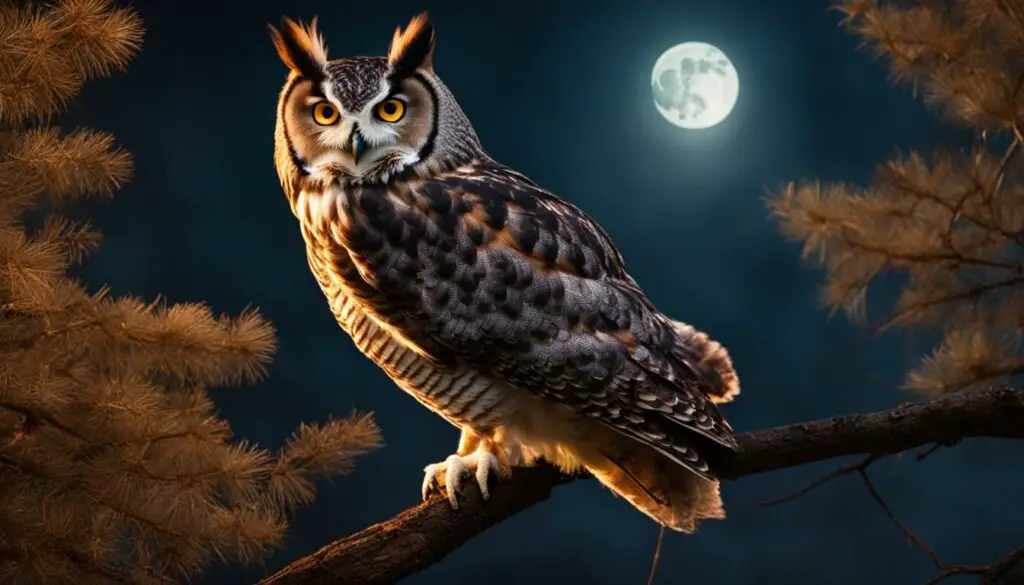
Throughout history, owls have been the subject of numerous superstitions and beliefs. Many cultures around the world view these majestic birds as sacred creatures, and harming them is considered taboo. Here are some of the most common superstitions associated with owls:
- Owls are messengers of death: In many cultures, including ancient Greece and Rome, the hooting of an owl was believed to signal an impending death.
- Killing an owl brings bad luck: Many people believe that killing an owl invites misfortune and bad luck into one’s life.
- Owls are witches in disguise: In some cultures, owls are thought to be witches or sorcerers in disguise, and harming them is believed to anger supernatural forces.
- Owls are bringers of wisdom: In contrast to the negative superstitions, some cultures see owls as bringers of wisdom and knowledge.
The superstitions surrounding owls often result in the birds being associated with dark magic and evil. In some cultures, people even believe that seeing an owl during the day is a bad omen.
“A wise old owl sat on an oak, the more he saw the less he spoke, the less he spoke the more he heard, why aren’t we like that wise old bird?”
The above nursery rhyme highlights the symbolic importance of owls as wise and knowledgeable creatures. However, despite their positive symbolism, owls’ association with death and the supernatural has contributed to widespread fear and mistrust of these birds.
Despite the prevalence of owl-related superstitions, scientific research has shown that these beliefs are largely unfounded. Owls are simply birds of prey that play an important role in maintaining ecological balance. As such, it is essential to respect and protect these magnificent creatures, rather than perpetuate false beliefs that could lead to their demise.
Consequences of Killing an Owl
Many cultures around the world believe that killing an owl can have severe consequences. While the superstitions and beliefs surrounding owl killings vary by region and society, the general consensus is that harming these magnificent birds can lead to bad luck, misfortune, or even death. In this section, we explore some of the potential consequences of killing an owl.
The Wrath of the Gods
In ancient civilizations, owls were often associated with deities or spirits, and killing one was considered a sacrilegious act. According to some cultural beliefs, harming an owl would bring down the wrath of the gods, leading to illness, famine, or natural disasters. In some mythologies, owls served as messengers of death, and killing one would hasten one’s own demise.
Ill Health and Misfortune
Many cultures believe that harming an owl can lead to severe physical or emotional problems. In some societies, killing an owl is thought to cause blindness, while in others, it is associated with infertility or impotency. Additionally, some people believe that harming an owl can bring about financial loss, family problems, or other misfortunes.
| Consequences of Killing an Owl | Cultural Beliefs |
|---|---|
| Illness and Discomfort | Some cultures associate harming an owl with physical ailments such as blindness or impotency. |
| Financial Loss | Many cultures believe that harming an owl can bring about financial loss or poverty. |
| Family Problems | Some people believe that harming an owl can lead to family problems or discord. |
Legal Consequences
In some countries, harming or killing owls is illegal and can result in fines or imprisonment. For example, in the United States, all owl species are protected by federal and state laws, and harming them can lead to a fine of up to $100,000 and imprisonment for up to a year.
Overall, the consequences of killing an owl can be severe, not just in terms of cultural or spiritual beliefs but also in legal terms. Many societies view these majestic birds with respect and reverence, and harming them is often taboo. By understanding the potential repercussions of owl killings, we can develop a greater appreciation for these fascinating creatures and the role they play in our world.
Cultural Views on Owl Killings
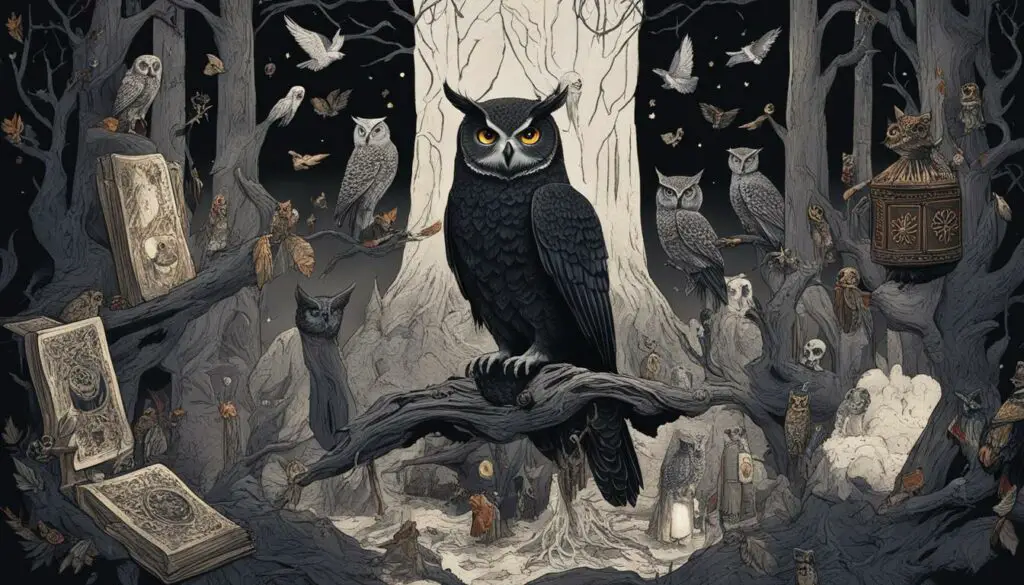
Owls have been revered and feared in different cultures since ancient times. Their association with wisdom, mystery, and death has resulted in various beliefs and practices surrounding owl killings. While some cultures consider killing an owl to be a taboo, others view it as a necessary sacrifice or a means of gaining power.
In Native American cultures, owls are believed to be messengers of the spirit world. Killing an owl is regarded as a grave sin since it is believed to offend the spirits and invite misfortune. In many African cultures, owls are considered to be sacred, embodying the spirits of the ancestors. Killing an owl is believed to bring about a curse that can harm not only the offender but also their family and community.
In some Asian cultures, owl killings are associated with dark magic or sorcery. Owls are believed to have magical powers, and their feathers and body parts are often used in spells and rituals. In some cases, owls are killed for their body parts, which are believed to have medicinal or aphrodisiac properties.
Table: Cultural Views on Owl Killings
| Culture | Beliefs about Owl Killings |
|---|---|
| Native American | Killing an owl is a taboo that invites misfortune and offends the spirits |
| African | Killing an owl is a grave sin that can bring about a curse on the offender, family, and community |
| Asian | Owl killings are associated with dark magic or sorcery, and owl body parts are believed to have magical properties |
Despite the widespread taboos and beliefs surrounding owl killings in different cultures, some continue to engage in this practice. In many cases, this is due to ignorance or a lack of understanding of the ecological and cultural significance of owls. Conservation efforts and education programs aimed at promoting awareness and respect for owls can help to change cultural attitudes towards owl killings and preserve the cultural value of these magnificent creatures.
Spiritual Significance of Owl Deaths
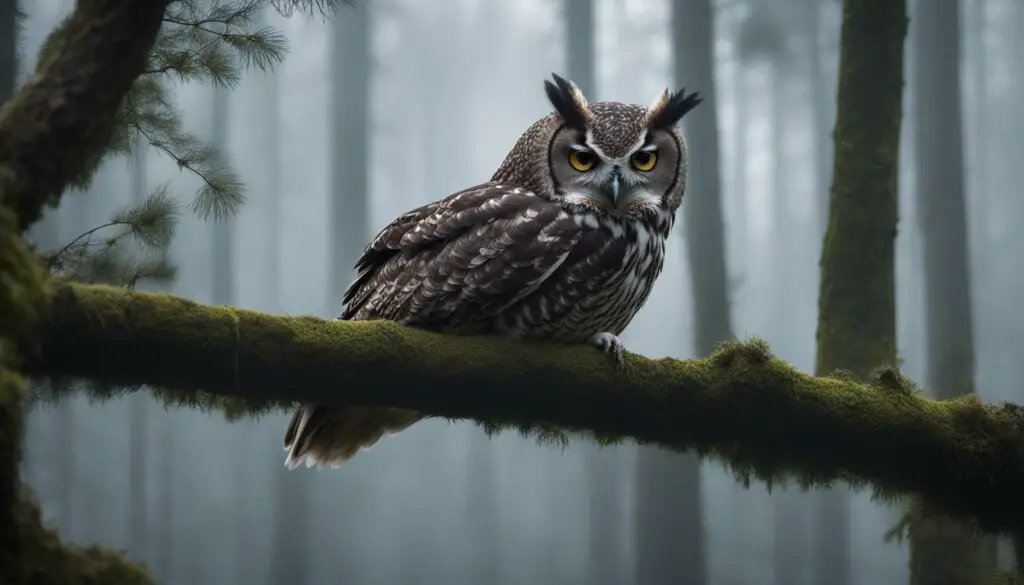
The death of an owl can carry a significant spiritual meaning in different cultures. Many people believe that owls are messengers of the spirit world and that their deaths may signal something significant that needs to be interpreted.
In Native American cultures, owls are often seen as a symbol of death and rebirth. The death of an owl may be interpreted as a sign of impending change or transformation, either in the individual’s life or in the community as a whole. Some tribes believe that killing an owl will bring bad luck and that the spirits of the owl may seek revenge on those responsible for the bird’s death.
In some African cultures, owls are believed to carry the spirits of ancestors, making them sacred animals. The death of an owl may be interpreted as a sign of displeasure from the ancestors, a warning to the community to pay attention to their actions.
In Hindu mythology, owls are associated with the goddess of wealth, Lakshmi. The death of an owl may be seen as a sign of impending financial hardship or a warning to take care of one’s wealth.
“The death of an owl may be interpreted as a sign of impending change or transformation, either in the individual’s life or in the community as a whole.”
Despite the varying interpretations of owl deaths, one common belief is that they should be treated with respect and reverence. Many cultures view owls as powerful and sacred creatures, and their deaths should be honored as such.
However, it is important to note that scientific research has shown that owl populations are declining due to habitat loss and hunting. Therefore, regardless of cultural beliefs, it is crucial to protect these magnificent birds and their habitats for future generations.
Mythological Interpretations of Owl Slayings
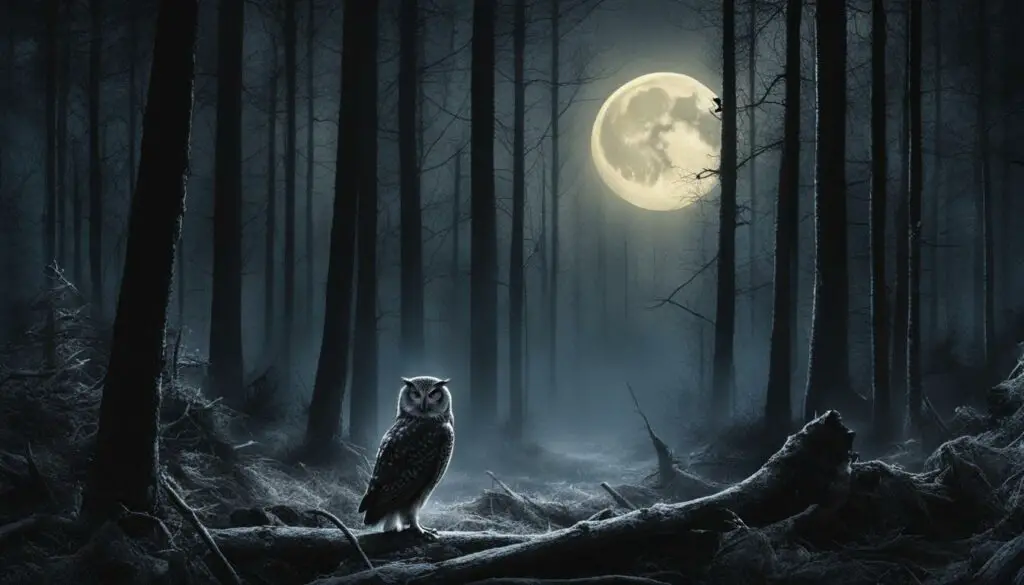
The ritualistic killing of owls has been a common theme in mythological tales throughout history. These stories have often attributed symbolic meanings to owl killings, shedding light on the broader cultural significance of these majestic birds.
In Greek mythology, the goddess Athena was often depicted with an owl perched on her shoulder. Owls were considered sacred to Athena, and their killings were believed to be a sacrilegious act. In one story, a soldier named Nyctimene kills an owl and is subsequently transformed into an owl himself as punishment for his crime.
In Hindu mythology, the goddess Lakshmi is associated with the owl, and owl killings are considered taboo. According to legend, the owl is a symbol of wealth and prosperity, and harming one can result in misfortune and financial loss.
The Haida people of the Pacific Northwest have a mythological tale that attributes the creation of the sun to an owl’s sacrifice. In this story, the owl willingly gives up its life to become the sun, symbolizing its importance in sustaining life on earth.
These are just a few examples of the rich mythological interpretations of owl slayings across different cultures. These stories often emphasize the importance of respecting and preserving these magnificent creatures, highlighting their spiritual and cultural significance.
“Owls were considered sacred to Athena, and their killings were believed to be a sacrilegious act.”
Historical Context of Owl Killings
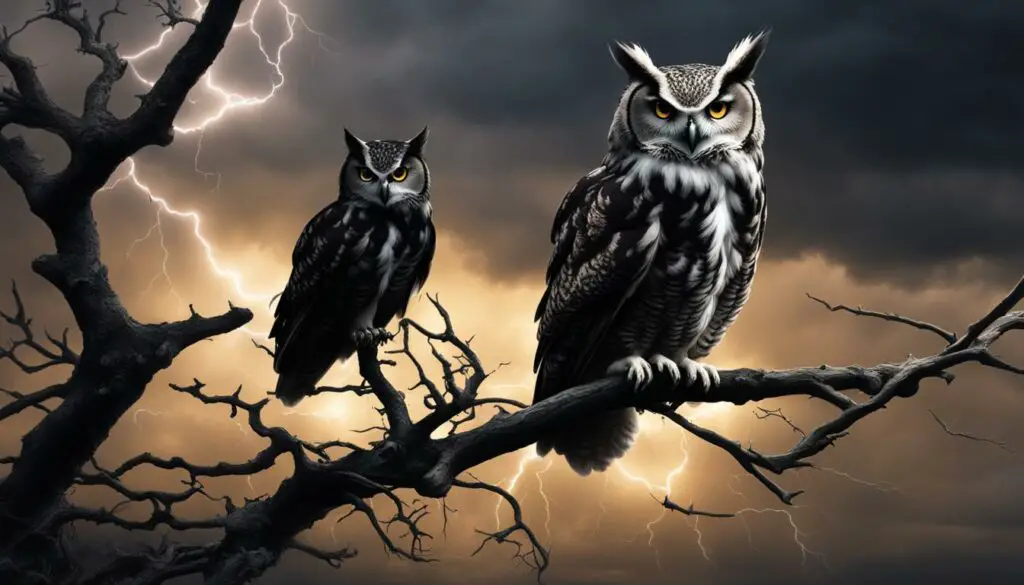
The killing of owls has a long and complex history, dating back to ancient times. In many cultures, owls were considered sacred or revered for their perceived wisdom, while in others they were feared as symbols of death or evil spirits. Regardless of the specific beliefs, one thing is clear: owl killing taboos have persisted throughout history.
In ancient Greece, for example, the owl was the symbol of the goddess of wisdom, Athena. Killing an owl was considered sacrilegious, punishable by death. Similarly, the Mayans believed that owls were messengers of the gods and killing one would bring bad luck and misfortune.
Throughout Europe during the Middle Ages, owls were associated with witchcraft and were believed to be witches’ companions. Killing an owl was deemed a way to break the spell and protect oneself from harm.
Some African cultures, too, believe that killing an owl will bring misfortune and disease. In parts of India, owls are seen as omens of death, and their killing is taboo. In Indonesia, the Javanese believe that if an owl lands on the roof of a house, it is a sign that someone in the family will die soon.
However, the reasons for owl killing taboos aren’t always rooted in superstition. In some cases, owls were hunted for their meat or feathers, used in various rituals or ceremonies. In others, they were seen as pests that damaged crops or threatened other animals.
The historical context of owl killings sheds light on the various cultural perspectives and beliefs surrounding these birds. Understanding the historical significance of owl killings can help us appreciate the cultural value of owls and recognize the importance of preserving them.
Cultural Views on Owl Killings
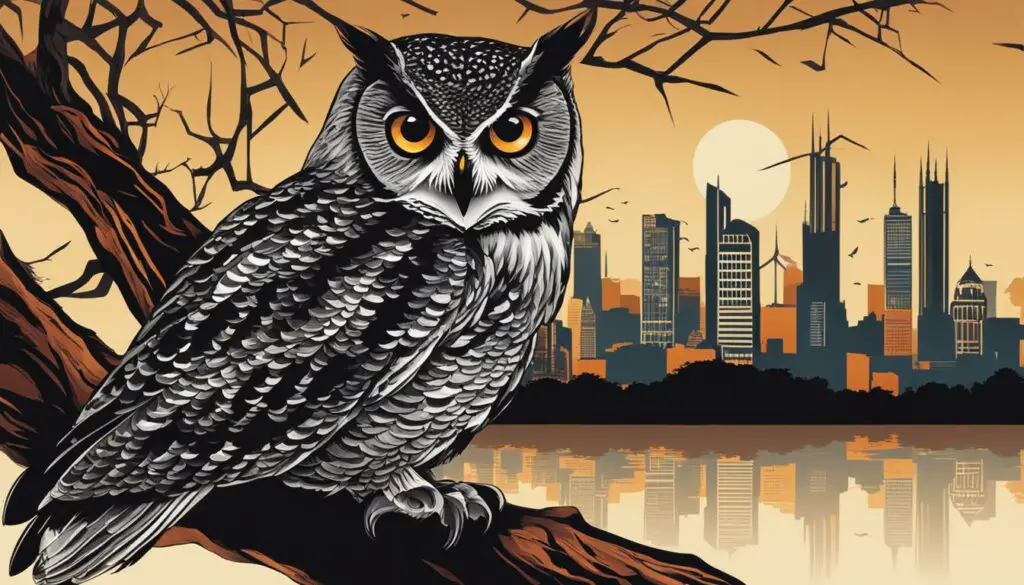
Cultures around the world have various beliefs about killing owls, ranging from taboo to necessary. However, in modern times, many societies have evolved their perspectives on owl killings.
In some cultures, owls have been revered as sacred creatures for centuries. For example, in ancient Greece, the owls were associated with the goddess Athena who was known for her wisdom, and killing an owl was considered a sacrilegious act.
Similarly, in Hindu mythology, the goddess Lakshmi has an owl as her vehicle, and harming an owl is considered a sin.
On the other hand, in some African cultures, owls are considered evil or omens of death, and killing them is believed to bring good luck and ward off bad spirits.
Regardless of cultural beliefs, one common theme is that owls are seen as important animals that should be treated with respect. This sentiment has led to conservation efforts in many countries to protect owl populations and their habitats.
Beliefs About Owl Killings
Despite advancements in scientific knowledge and changing perspectives towards owl killings, some people still believe in the superstitions surrounding the act.
In some parts of the world, it is believed that killing an owl can bring misfortune or bad luck. For example, in India, it is thought that if an owl is killed in or near a house, then it will bring poverty or illness to the inhabitants. Similarly, in some African cultures, it is believed that killing an owl will cause a drought.
However, these beliefs are not supported by scientific evidence and are considered to be based on superstitions and folklore rather than facts.
The Role of Education and Awareness
Education and awareness play an important role in changing cultural beliefs and practices towards owl killings. By providing scientific explanations and encouraging conservation efforts, people can develop a greater understanding of the ecological and cultural value of owls.
Organizations such as the World Owl Trust and the Owl Research Institute are working to promote awareness and conservation efforts worldwide. Through research, educational programs, and community outreach, these organizations are helping to cultivate a more compassionate and sustainable approach towards owl populations.
“We must preserve these magnificent creatures for future generations to appreciate and admire.” – World Owl Trust
Overall, cultural beliefs and practices towards owl killings vary widely across the world. While some cultures revere owls as sacred animals, others view them as pests or omens of death. Regardless of cultural differences, education and awareness are key to promoting a more compassionate and sustainable approach towards owl populations and their habitats.
Debunking the Myths
There are numerous superstitious beliefs surrounding owl killings, but many of these lack scientific evidence or logical reasoning. Let’s examine and debunk some of the most common myths:
Myth: Killing an owl brings good luck.
Fact: There is no credible evidence to support this claim. In fact, harming owls can have negative consequences for ecosystems and biodiversity.
Myth: Owls are evil creatures.
Fact: This misconception stems from their association with darkness and mystery. In reality, owls are integral components of many ecosystems and play important roles in controlling pest populations.
Myth: Owls are harbingers of death.
Fact: While owls have been associated with death in some cultures, there is no evidence linking them to harm or danger towards humans. Many cultures consider the presence of owls to be a positive sign, representing wisdom and protection.
It’s important to separate fact from fiction when it comes to beliefs about owl killings. By debunking these myths, we can better understand and appreciate the true value of these magnificent creatures.
Cultural Value of Owls
Owls have been revered as symbols of wisdom and insight in various cultures throughout history. Their nuanced symbolism has played an integral role in storytelling, art, and literature.
The cultural views on owl killings vary depending on the society and time period. In some cultures, owls are considered sacred creatures, and harming them is taboo. For example, in Native American culture, owls are believed to possess healing powers and are considered spiritual messengers. Similarly, in ancient Greek mythology, owls symbolized wisdom and were associated with the goddess Athena. Killing an owl was viewed as a sacrilege and a sign of disrespect to the goddess.
In contrast, some cultures associate owls with death, darkness, and evil, and killing them is seen as a way to ward off evil spirits or bad luck. For instance, in Mexican folklore, the owl is known as “la lechuza,” a witch who can transform into an owl to cast spells on people. Killing an owl was thought to break the spell and protect against the witch’s power.
Despite these varied beliefs, the conservation of owls is crucial in modern society. Owls play a critical role in maintaining ecological balance by controlling rodent populations and other insects. Additionally, they are important indicators of environmental health, and their presence signals the presence of a healthy ecosystem.
Protecting owls means protecting the cultural and ecological value associated with these magnificent creatures. By preserving their habitats, supporting conservation efforts, and educating people about the importance of owls, we can ensure their survival for generations to come.
Conclusion
Throughout this article, we’ve explored the beliefs and superstitions surrounding owl killings in various cultures. From the symbolic meanings of owls to the spiritual interpretations of their deaths, we’ve highlighted the diverse perspectives on these magnificent creatures.
While killing an owl is often considered bad luck, we’ve also seen how conservation efforts and changing perspectives have helped to preserve owl populations. It’s essential to recognize the cultural and ecological value of owls and to treat them with the respect they deserve.
The Significance of Cultural Beliefs
Cultural beliefs and superstitions can have a powerful impact on people’s lives, and it’s important to understand and respect them. However, it’s also vital to challenge misconceptions and myths surrounding owl killings. By debunking these beliefs, we can move towards a more rational and compassionate approach to owls.
The Importance of Owl Conservation
Owls play a crucial role in the ecosystem, helping to control rodent populations and maintaining a healthy balance in nature. Conservation efforts and scientific knowledge have helped us to better understand and appreciate these remarkable creatures.
By preserving owl habitats and promoting awareness of their cultural and ecological significance, we can ensure that they continue to thrive for generations to come.
Ultimately, we hope this article has provided a valuable insight into the beliefs and superstitions surrounding owl killings. By learning from the past and embracing new perspectives, we can move towards a more enlightened and compassionate understanding of these majestic birds.
FAQ
Is killing an owl really bad luck?
Yes, killing an owl is often considered bad luck in various cultures. It is believed to invite misfortune and negative consequences into one’s life.
Why are owls considered symbolic creatures?
Owls are often associated with wisdom, messengers, or omens of death in various cultures. Their unique characteristics and behaviors contribute to their symbolism.
What are some superstitions about owls?
Superstitions about owls vary across cultures. They are often seen as symbols of death or believed to bring bad luck when harmed or killed.
Are there any consequences for killing an owl?
The consequences of killing an owl are primarily rooted in cultural beliefs and traditions. These may include inviting bad luck, misfortune, or negative energy into one’s life.
How do different cultures view owl killings?
Owl killings are generally viewed with reverence or fear in many cultures. They are regarded as taboo acts that may disrupt the balance of nature or attract spiritual consequences.
What is the spiritual significance of owl deaths?
Some believe that owl deaths carry spiritual messages or serve as signs from the divine realm. Interpretations may vary depending on cultural or personal beliefs.
Are there any mythological interpretations of owl slayings?
Yes, many mythological tales involve the killing of owls. These stories often hold symbolic meanings and provide lessons within the context of broader cultural beliefs.
Why were there historical taboos surrounding owl killings?
Throughout history, various ancient beliefs, practices, and rituals associated with owls led to taboos and prohibitions surrounding their killings. These were often influenced by cultural and spiritual factors.
How have beliefs about owl killings changed in modern society?
In modern society, beliefs about owl killings have evolved due to conservation efforts, scientific knowledge, and changing perspectives. People are becoming more aware of the cultural and ecological value of owls.
Are there any misconceptions about owl killings?
Yes, there are common myths and misconceptions surrounding owl killings. These beliefs can be debunked by scientific explanations and rational perspectives.
What is the cultural value of owls?
Owls hold cultural value due to their symbolism, conservation efforts, and ecological importance. They are seen as majestic creatures deserving of preservation and respect.
